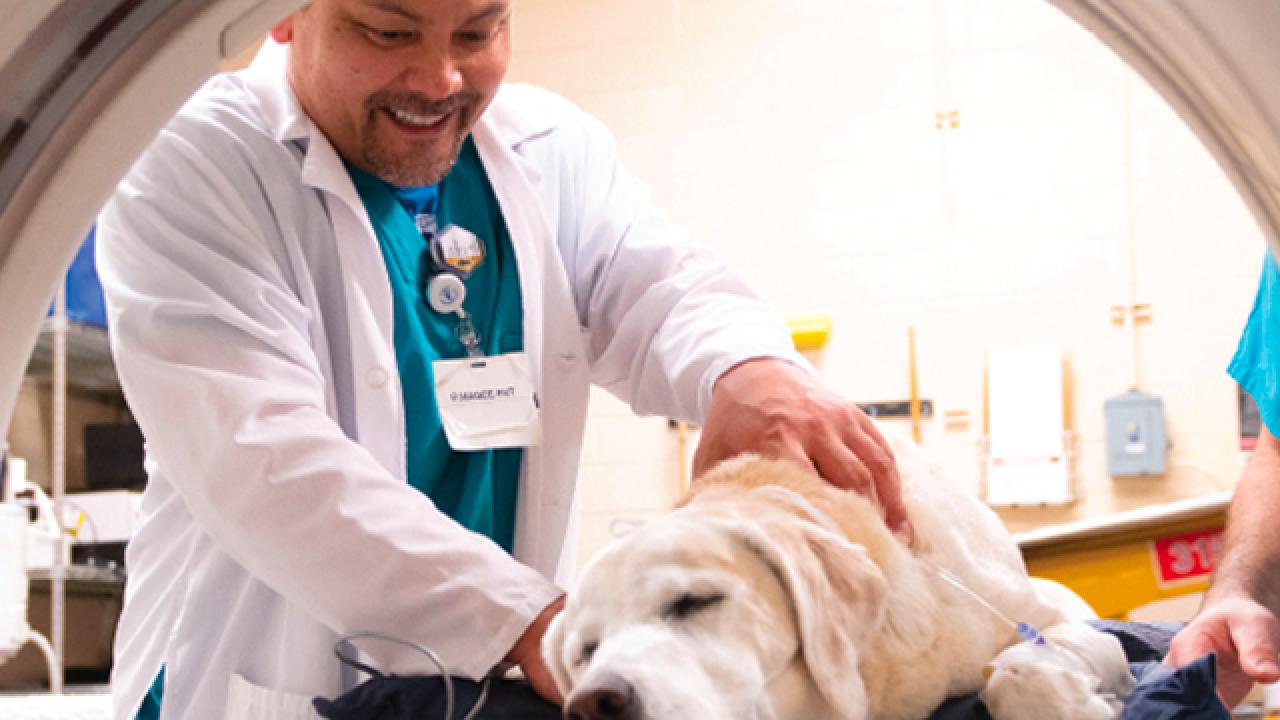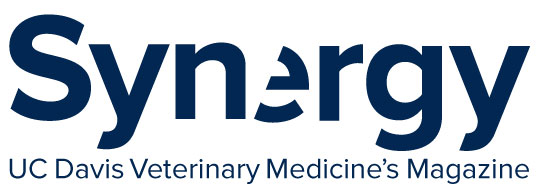
Veterinary Medical Center
Big Vision for New Imaging Center
When Kevin, a 3-year-old cat, was attacked by a dog, his injuries required advanced imaging to determine the extent of his maxillofacial injuries. A CT scan helped oral surgeons successfully develop a complex surgical plan to repair his fractured mandible. The CT process was then repeated postoperatively to ensure complete healing.
This is just one example of the importance of imaging to treatment success. The more sophisticated the imaging technology available, the better the chance of a successful outcome. Fortunately, UC Davis is on the forefront of imaging technology, having recently led in the development of a first-of-its-kind small animal whole-body combined positron emission tomography (PET) and computed tomography (CT) scanner, and a PET scanner specifically designed to image the lower legs of standing horses.
Now, UC Davis is creating a new All Species Imaging Center (ASIC) as a major component of the Veterinary Medical Center (VMC). This centrally located placement of imaging technology and expertise will expedite diagnosis and patient care, reduce stress and wait time for our patients, and optimize operational efficiencies.
Advancements in medical technology are rapidly driving a new age of diagnostic imaging. The veterinary hospital is leading the way in this capacity, and the ASIC will bring together MRI, CT, and PET scans under one roof to better serve patients and clients, and increase the school’s ability to further innovate and train in the field.
“Advanced imaging is fundamental to patient care and discovery across multiple disciplines including surgery, oncology, neurology, dentistry, and many other clinical specialties,” said Dr. Allison Zwingenberger, director of Imaging Services. “New imaging modalities such as PET scans will enhance our technical advantages and strengthen the recruitment of excellent faculty and staff. The ASIC will bring together veterinarians, physicians, researchers, and other scientists across multiple disciplines to advance innovation in imaging to enhance the health of animals and people.”

The ASIC will be staffed by the largest veterinary diagnostic team in the world, as well as become a primary training center for the world’s largest imaging residency program, providing a rich learning environment. It will place UC Davis on the cutting edge of detecting, diagnosing, and treating disease and trauma.
By utilizing information learned through research, radiologists and clinicians at the VMC will continue to advance the care and rehabilitation of all animals. As an example, PET scan technology can diagnose injuries that are not visible with other imaging modalities. Equine sports medicine specialties are utilizing this technology to improve lameness detection and objective assessment of gait. The key to the successful resolution of lameness is accurate diagnosis and determination of primary versus secondary sources of pain. Early detection of problems — before the horse is sidelined — improves a safe return to athletic function and reduces the likelihood of a catastrophic injury.
The ASIC will also expand MRI capability and enable space for a larger and stronger 3T unit to expand clinical operations to small animals and horses and enhance research discoveries. Clinical and research MRI caseload at UC Davis has steadily increased over the past 20 years, nearly tripling since the early 2000s.
Many preliminary projects have commenced to prepare for construction of the ASIC. Currently, contractors are installing utility lines throughout the large animal complex to prepare the site for the center, which will stand immediately to the south of the main hospital building. Construction will begin later in 2022, with expected completion in 2023.
As for Kevin, he has completely recovered from his injuries. UC Davis veterinarians are excited to see the ASIC, with its advanced imaging techniques, contribute to thousands of more successful cases like Kevin’s over the coming years.
To learn more about the VMC, please contact our Advancement team at 530-752-7024.
